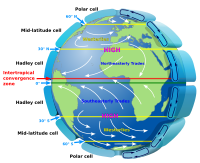
Photo from wikipedia
Strong winds may be biased in atmospheric models. Here the ECMWF coupled wave-atmosphere model is used (1) to evaluate strong winds against observations, (2) to test how alternative wind stress… Click to show full abstract
Strong winds may be biased in atmospheric models. Here the ECMWF coupled wave-atmosphere model is used (1) to evaluate strong winds against observations, (2) to test how alternative wind stress parameterizations could lead to a more accurate model. For the period of storms Kaat and Lilli (23 to 27 January 2014), we compared simulated winds with in-situ – moored buoys and platforms - and satellite observations available from the North Atlantic. Five wind stress parameterizations were evaluated. The first result is that moderate simulated winds (5-20 m s-1) match with all observations. However, for strong winds (above 20 m s-1), mean differences appear, as much as -7 m s-1 at 30 m s-1. Significant differences also exist between observations, with buoys and ASCAT-KNMI generally showing lower wind speeds than the platforms and other remote sensing data used in this study (AMSR2, ASCAT-RSS, WindSat, SMOS and JASON-2). It is difficult to conclude which dataset should be used as a reference. Even so, buoy and ASCAT-KNMI winds are likely to underestimate the real wind speed. The second result is that common wave-age dependent parameterizations produce unrealistic drags and are not appropriate for coupling, whereas a newly empirically-adjusted Charnock parameterization leads to higher winds compared to the default ECMWF parameterization. This proposed new parameterization may lead to more accurate results in an operational context.
Journal Title: Quarterly Journal of the Royal Meteorological Society
Year Published: 2018
Link to full text (if available)
Share on Social Media: Sign Up to like & get
recommendations!